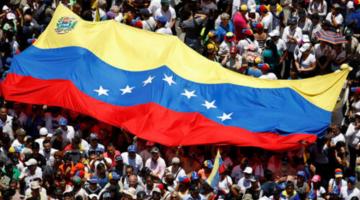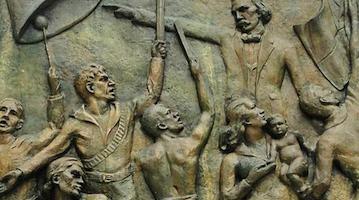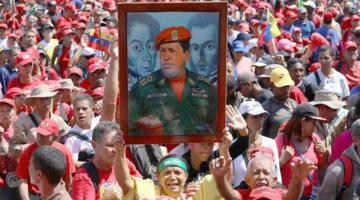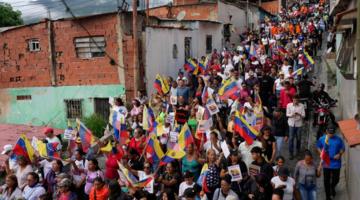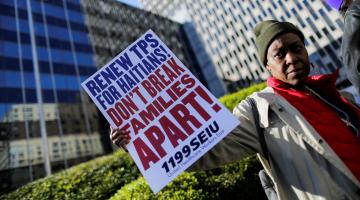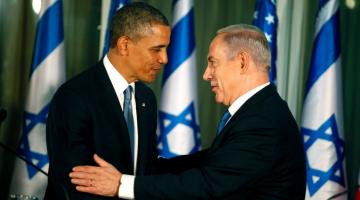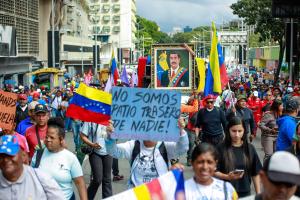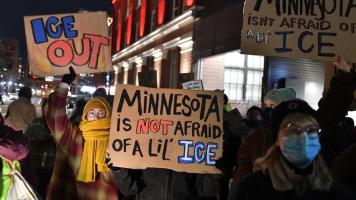Leslie Voltaire, president of Haiti welcomed Colombia’s President, Gustavo Petro in December 2024. Credit: Juan Diego Cano / Presidency of Colombia.
The latest interference from the United Nations ensures that Haiti’s “gang” problem will continue and that its cause, an illegitimate governing structure brought about by the UN, U.S. and their partners, will go unaddressed in favor of more intervention. Support for Haitian sovereignty is a litmus test for anti-imperialists.
“Colombia is willing to participate in the effort to dismantle gangs in Haiti to overcome violence and allow the free expression of the Haitian people.”
Gustavo Petro, President of Colombia
At the recent United Nations General Assembly meeting, Gustavo Petro gave an impassioned speech on behalf of the Palestinian people. It was quite rightly held up as an example of leadership by a head of state, who spoke out forthrightly against a genocide and amplified calls for an international task force under a Uniting for Peace resolution which would prevent permanent Security Council members like the United States from using their status to veto any actions. Petro rose in international esteem after the Trump administration revoked his visa and when he returned to Colombia he expelled Israeli embassy staff after two Colombians were amongst those captured and detained on the Smud freedom flotilla to Gaza. Yet Petro has now declared that his country will participate in the latest scheme that will bring further destabilization to Haiti, and joined the ranks of the group that perhaps should be known as Leftists Except for Haiti.
On September 30th the United Nations Security Council passed Resolution 2793 which calls for the establishment of a Gang Repression Force (GSF). Twelve nations on the Security Council voted for the resolution, none objected, and Russia, China, and Pakistan abstained. No one is denying the horrific impact of the paramilitary groups, commonly referred to as gangs, that are now operating in Haiti and creating great suffering for the people there. But their presence is the end result of years of interventions and occupations, coups engineered by Washington and its western allies, including the United Nations Core Group, which has quite literally chosen leadership for Haiti without the input of its people and created a country without a legitimate government.
While other nations in the Americas are defended by leftist elements and their rights of sovereignty are supported, Haiti gets little such consideration. Its situation is said to be more complicated than others and nations held up as being progressive or left succumb to the siren call of racism which relegates Haiti to being viewed as a nation that will never be able to resolve its problems. This view is somewhat correct in that the constant interference from the U.S. and its partners does in fact ensure instability for its people, but the guilty parties never see themselves as being responsible.
The end of the mandate for the Multinational Security Support Mission (MSS) – itself illegitimate and illegal – was the impetus for this continuing attack on Haitian sovereignty and, like every other mandate, the FRG will only bring the kind of foreign occupation to Haiti that is usually condemned by Petro and his political ilk.
Dr. Jemima Pierre, Black Agenda Report Editor and Contributor, posed these questions three years ago: “Why is it so easy for these nonwhite and oppressed nations to come and serve U.S. and Western imperial interests in Haiti? Could it be that they, too, have imbibed the dehumanized and, frankly, racist views about Haitian people?”
Petro joins Brazil’s Lula da Silva, whose country led the disastrous MINUSTAH occupation from 2004 to 2017 which brought police terrorism, sexual assaults, and cholera to Haiti after the western coup ousted president Jean-Bertrand Aristide. But it is not just Brazil and Colombia who collaborate with Haiti’s enemies. The mostly Black nations of the Caribbean, members of the Caribbean Community (CARICOM) provide cover for these interventions, giving legitimacy to Haiti’s punishment for daring to be the hemisphere’s first Black republic.
CARICOM’s collaboration was a factor in the decisions by China and Russia not to use their veto power against this resolution. Russia’s permanent representative, Vassily Nebenzia, explained why his country abstained: “The decisive factor for us was the opinion of the Haitian authorities and neighboring states, who strongly requested that we not obstruct the adoption of this document.” China’s representative, Fu Cong, also mentioned the support for the resolution from the region but expressed serious concerns: “We cannot help but ask: How can we ensure that the gang suppression force will not repeat past mistakes? Is the hasty deployment of yet another multinational force a responsible approach towards the Haitian people?”
It is indeed unfortunate that neither country chose to use their veto power to stop this latest assault on Haitian sovereignty. The U.S., of course, is the force behind pushing for this resolution and using a puppet state, Panama, to advocate for its implementation. Haiti’s enemies are not just in Washington, and Paris, and in the U.N. headquarters. The puppet states of CARICOM and regional neighbors such as Panama, Mexico, and Colombia are also complicit in carrying out yet another crime against Haiti and in convincing those nations with the power to say “no” to instead go along with another attack on Haiti under the guise of humanitarian concern.
The only hope for Haiti is the end of colonial control and freedom from all U.N. mandates which bring that country into ever worsening states of decline. The so-called gang problem is a problem of U.S. imperialism and the presence and power of paramilitary groups have only accelerated with every occupation – BINUH, MINUSTAH, MSS and GSF are all cut from the same cloth. They deprive the people of Haiti of their rights of sovereignty and guarantee violence and destabilization.
It is indeed tragic that Gustavo Petro and others do not speak up for the Haitian people as they do for the Palestinian people. Petro’s analysis of the Gaza genocide is on point, and lays blame where it belongs and brings a new idea to the table that will stop the cycle of U.S. vetoes which prevent true humanitarian resolution to Palestinians.
Haitians deserve the same consideration. Every year United Nations member states vote overwhelmingly to end U.S. sanctions against Cuba, as they should. But Haiti is seen in a different light, a very negative light, which presents it as an intractable problem that can only be solved by outsiders. The obvious truth of outside forces continuing violence and poverty is cast aside in favor of tropes about Black people being unable to govern themselves. Colombia’s “participation” in the newest occupation will do nothing to free Haitians. The same ability to discern the truth about the rest of the world must be applied to Haiti as well, lest these destructive occupations go on forever.
Margaret Kimberley is the author of Prejudential: Black America and the Presidents. You can support her work on Patreon and also find it on the Twitter, Bluesky, and Telegram platforms. She can be reached via email at margaret.kimberley@blackagendareport.com.



